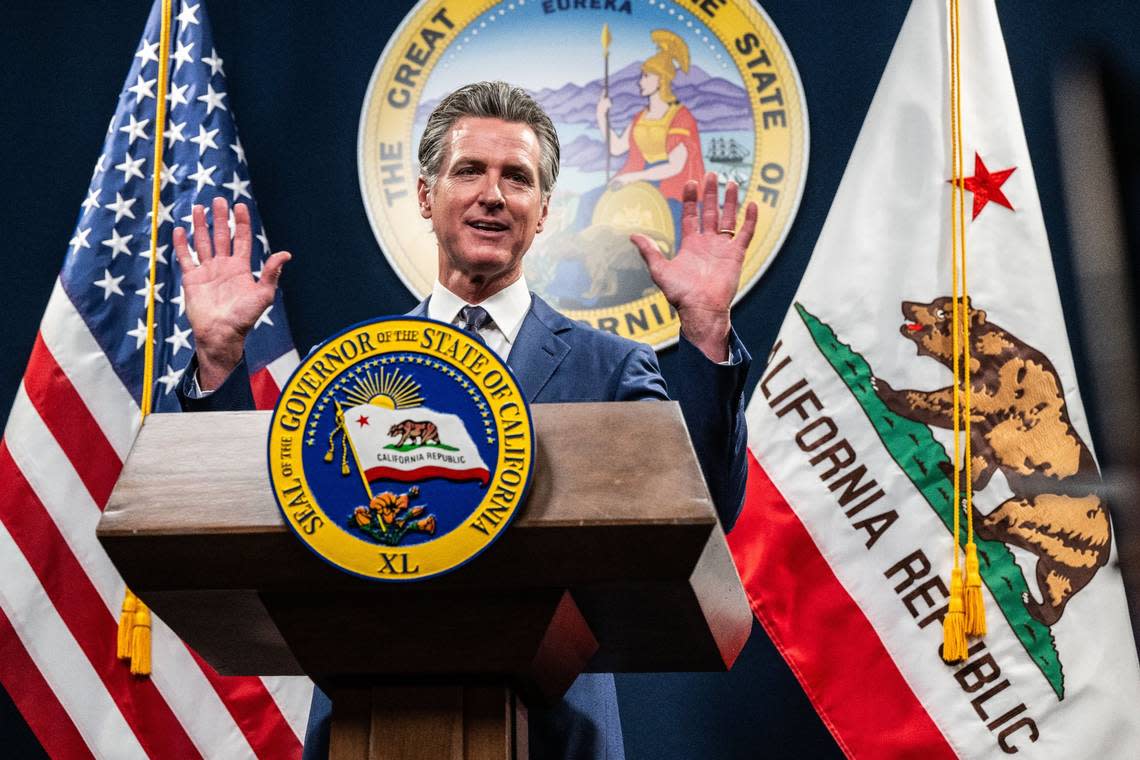Newsom administration releases plan that could speed up California insurance price increases

Gov. Gavin Newsom’s administration released a highly-anticipated proposal meant to speed up California’s review of price increases for home and automobile coverage that the governor said weeks ago was needed to provide urgent help while the state faces severe insurance turmoil.
The draft version released Tuesday requires the Department of Insurance to more quickly evaluate price hikes that companies must request and have approved before they go into effect. Yet the plan was immediately met with the threat of a legal challenge.
The time it currently takes the agency to sign off on rate changes has frustrated insurers, who argue higher prices are needed to stem losses due to catastrophic wildfires, growing risks from climate change and inflation. Major companies have limited and cut back coverage in recent years, leaving Californians with fewer options to turn to and bills that jump every year.
The Personal Insurance Federation of California, which represents large companies, including State Farm, Allstate and Farmers Insurance, expressed support for the proposal. The plan is “an important part of restoring a healthy insurance market,” Seren Taylor, a lobbyist and the organization’s vice president, said in a statement Tuesday, calling it “a far better option than the current rules that resulted in an insurance crisis for many Californians.”
The department receives hundreds of requests annually from companies to change their prices for home, auto and other coverage. Earlier this year, the department had roughly 170 pending home and auto price applications alone. Its evaluations can sometimes take more than a year.
The new proposal requires the department to respond to those requests in 120 days. If the agency disagrees with the desired rate, it must provide its own recommendation to the insurer, which the company can accept.
That said, there is still room for delays beyond that timeline.
If the company rejects the suggested rate, the approval process will continue.
State law also allows people and organizations to dispute proposed price increases before they go into effect. Those challenges add time to the evaluation.
If a company wants to hike prices by an average of more than 7%, the department will still provide insurers with a suggested rate in 120 days. But challengers will be able to reject what the agency recommends. That will force the evaluation to continue, even if the company agrees with the agency’s proposal.
Last year, companies submitted more than 500 requests to the department to change prices. Petitions to intervene were filed in 18 of those applications. All were put forward by the advocacy organization Consumer Watchdog.
Its founder, Harvey Rosenfield, slammed the new proposal in an interview Tuesday, saying it was an “attempt to stifle public scrutiny and accountability.”
“I don’t think there’s really any problem with the rate review process that couldn’t be handled by putting more resources at the Department of Insurance to more quickly process the applications the companies make,” said Rosenfield, who authored Proposition 103, the voter-approved measure that requires the state to sign off on price changes.
If the Legislature didn’t change the draft, he called a legal challenge “inevitable.”
The new plan comes as Insurance Commissioner Ricardo Lara is unveiling a series of rule changes with the goal of spurring companies to write more policies in the state and give homeowners greater availability.
One of them, announced in February, is also meant to quicken the review of proposed price increases. It was intended to clarify the information companies need to submit before their requests are evaluated. But industry trade groups weren’t in favor of that initial plan, which is still under regulatory review.
Lara wants all of his department’s proposed rule changes to be approved by December. Newsom, during a May 10 press conference, said the state couldn’t wait for that timeline and vowed to provide more immediate relief.
“We need to move,” he said. Yet it wasn’t clear what the governor wanted to do and his office did not immediately have additional details to share.
The lack of clarity continued for more than two weeks, leaving legislators, advocacy organizations and companies eagerly waited for the administration’s plan.
The proposal has the backing of Lara who said in a statement that it was just one piece in his larger strategy and would help hold companies and rate challengers accountable.
“We will continue to thoroughly review each and every rate application filed to make sure they are compliant with our laws and justified under Prop. 103, and that consumers are protected,” he said.
The administration’s proposal now goes in front of the Legislature and will be attached to the budget as a so-called trailer bill.
That will allow lawmakers to act on it more quickly than if it was introduced as a traditional bill. And it will also go into effect immediately if it passes.
The plan received early support from Sen. Susan Rubio, a Democrat who represents areas east of Los Angeles and chairs the Senate Insurance Committee. In a statement she said she “could not be more pleased with” the governor’s plan to “help reduce unnecessary red tape.”
Senate President Pro Tem Mike McGuire, a Democrat representing the state’s north coast, was more noncommittal in his response.
“We are knee-deep in budget negotiations,” he said in a statement, “and we’ll be examining the governor’s proposal as part of that process.”

